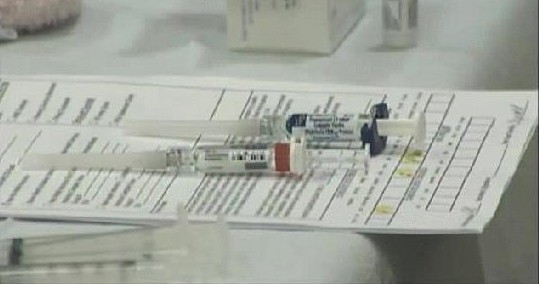
A bill designed to make it harder for parents in California to opt out of school vaccination requirements is now a step closer to being enacted, just a week after it was put on hold in the face of intense opposition by anti-vaccination activists.
California’s Senate Education Committee on Wednesday voted to advance Senate Bill 277, which would require all schoolchildren to get vaccines for communicable diseases such as measles and polio. The bill was drafted in response to the outbreak of measles that began at Disneyland in December and infected more than 150 people from seven states. Of the 81 Californians infected whose vaccination status is known, 70 percent were unvaccinated.
Authored by Democratic Senators Ben Allen of Santa Monica and Richard Pan of Sacramento, the bill would end the so-called personal beliefs exemption in California’s vaccination law, which allows parents to opt out of school vaccination requirements if they have religious or other opposition to vaccination. It would still allow parents to opt out if a doctor says the child should not be vaccinated for medical reasons.
All U.S. states require vaccinations for children entering school unless they have a medical reason to avoid the shots, such as a weak immune system. Most states also allow parents to opt out if their religion bans the protective procedure and about 20 allow for broader personal beliefs exemptions, which in recent years have been used by parents who fear a now-debunked link between vaccines and autism, or cite other unfounded worries about the health effects of children receiving shots.
In California, exemptions based on personal belief have risen dramatically in recent years. At least 27 counties in the state now have kindergarten immunization rates that are too low to confer herd immunity (below 92-94 percent), and in some individual schools and districts, more than half of children are not vaccinated. Hoping to prevent another Disneyland-like outbreak, lawmakers are now working to address these gaps in coverage.
“We have to worry about the next [outbreak],” said Rep. Pan, who is also a practicing pediatrician in the Sacramento area. “The goal of the bill is to get our immunization rates high enough so people don’t have to worry about themselves and their children getting preventable diseases.”
Vitriolic response
The bill was first brought to the education committee earlier this month but was pulled before a vote because of vociferous protests from anti-vaccination lobbyists. The version of the bill that was voted through today includes amendments that allow unvaccinated children to study in organized groups at home.
Pan pointed out that, contrary to what some opponents have claimed, the new law is not a universal requirement for vaccination. “But if you don’t vaccinate your child, you must take responsibility,” he said. “If you’re not getting your kids vaccinated, you can still home school them, but you won’t be putting them in with kids that are not getting vaccinated due to genuine medical necessity.”
If the bill gets through all the legislative hurdles, it could be written into law by September and enacted at the start of 2016. Mississippi and West Virginia are the only two other states to have such a law.
That’s a big if though. The bill has provoked vitriolic responses from the anti-vaccination crowd, with a Facebook post portraying one of the senators as a Nazi and death threats being sent to the offices of both senators. Opposition from anti-vaccine parents, many of them affluent and well-educated, have managed to kill similar bills introduced in the wake of the Disneyland outbreak, including one in Oregon.
Despite the opposition, the need for such a bill is clear. Research has shown that vaccination rates are significantly lower in states with broader vaccine exemption criteria. Not surprisingly, rates of vaccine-preventable diseases are also far higher in these states — according to one study, states with lax exemption policies have whooping cough rates up to 90 percent higher than states with more rigorous exemption criteria.
Meanwhile, the U.S. isn’t the only country struggling with its vaccination rates. The Disneyland outbreak is dwarfed by an ongoing measles epidemic in Germany. As of Monday, there have been 1,738 cases reported, quadruple the total number for 2014. The outbreak has led to calls for mandatory measles vaccinations.
In Australia, the government announced a “no jab, no pay” policy last week that will mean withholding welfare payments from parents who fail to have their children immunized. It follows the death of a 4-week-old baby last month from whooping cough, who was too young to be vaccinated against the disease.
